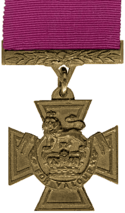Thomas Bernard Hackett facts for kids
Quick facts for kids
Thomas Bernard Hackett
|
|
|---|---|
 |
|
| Born | 15 June 1836 Riverstown, County Tipperary |
| Died | 5 October 1880 (aged 44) Arrabeg, King's County |
| Buried |
Lockeen Churchyard, County Tipperary
|
| Allegiance | |
| Service/ |
|
| Rank | Lieutenant colonel |
| Unit | 23rd Regiment of Foot |
| Battles/wars | Crimean War Indian Mutiny Third Anglo-Ashanti War |
| Awards | Victoria Cross |
Thomas Bernard Hackett (born June 15, 1836 – died October 5, 1880) was an Irish soldier. He was born in Riverstown, County Tipperary. He is famous for receiving the Victoria Cross, which is the highest award for bravery in the British and Commonwealth forces. This special medal is given for incredible courage when facing the enemy.
A Heroic Act in India
Thomas Hackett was 21 years old when he showed amazing bravery. He was a lieutenant in the 23rd Regiment of Foot (which later became The Royal Welch Fusiliers) in the British Army. This happened during the Indian Mutiny in 1857.
On November 18, 1857, in a place called Secundra Bagh in Lucknow, India, Lieutenant Hackett did something truly heroic. He and another soldier, George Monger, rescued a corporal from their regiment. This corporal was wounded and stuck in a very dangerous spot, under heavy enemy fire.
Lieutenant Hackett also showed great courage by climbing onto a roof. He was under heavy fire, but he cut down the straw roof of a bungalow. He did this to stop the building from catching fire. This was a very important action at the time.
His award paper, called a citation, explains his brave actions:
23rd Regiment, Lieutenant (now Captain) Thomas Bernard Hackett
Date of Act of Bravery,18th November, 1857
For daring gallantry at Secundra Bagh, Lucknow, on the 18th November, 1857, in having with others, rescued a Corporal of the 23rd Regiment, who was lying wounded and exposed to very heavy fire. Also, for conspicuous bravery, in having, under a heavy fire, ascended the roof, and cut down the thatch of a Bungalow, to prevent its being set on fire. This was a most important service at the time.
Later Life and Legacy
Thomas Hackett continued his military career and later became a lieutenant colonel. He sadly died in an accident involving a firearm on October 5, 1880. This happened in Arrabeg, King's County (which is now called County Offaly).
Today, his Victoria Cross medal is on display. You can see it in the Lord Ashcroft Gallery at the Imperial War Museum in London.
 | Shirley Ann Jackson |
 | Garett Morgan |
 | J. Ernest Wilkins Jr. |
 | Elijah McCoy |

